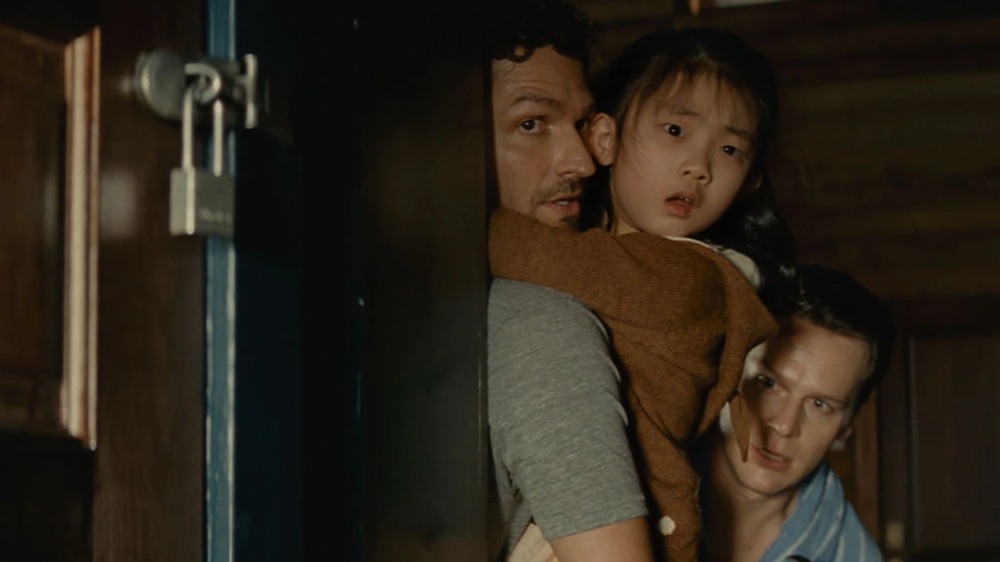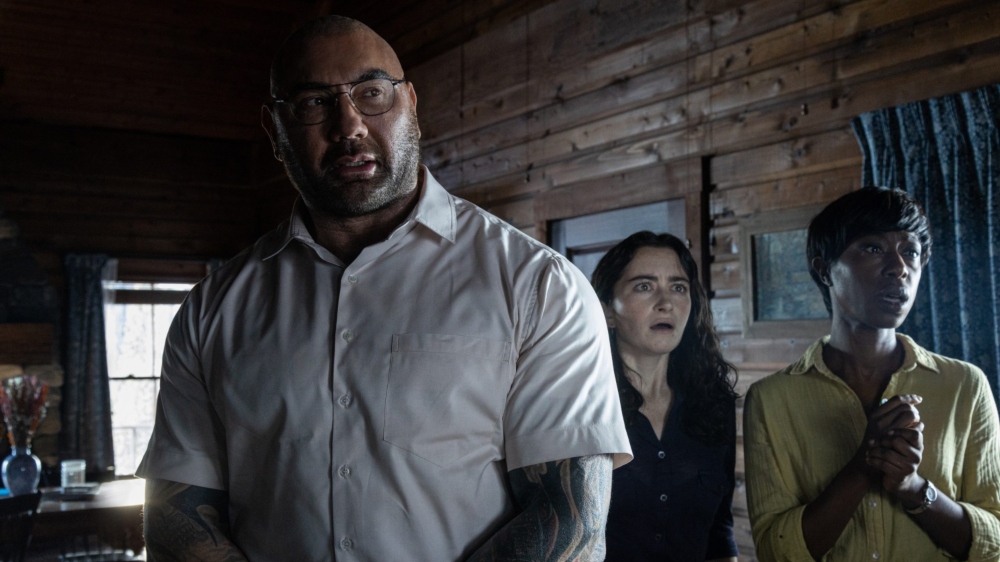Artists who catch lightning in a bottle early in their careers frequently fail to live up to their promised potential. This was certainly the case of writer/director M. Night Shyamalan, whose stunning success with The Sixth Sense back in 1999 yielded a couple of smaller hits like Unbreakable and Signs before leading to a string of underperformers including Lady in the Water, The Happening, The Last Airbender, and After Earth. However, his latest film, Knock at the Cabin continues the filmmaker’s comeback and showcases his unique talent for crafting suspense, as it follows a family of three whose idyllic summer retreat is interrupted by some unwelcome strangers bearing terrible news.
Knock at the Cabin stars Jonathan Groff and Ben Aldridge as husband and husband Eric and Andrew, who are spending some quiet time with their adopted daughter Wen (Kristen Cui) at a remote cabin in the woods when four strangers come knocking. Led by the bulky but benevolent Leonard (Dave Bautista), who is accompanied by a trio of disparate-looking people — Nikki Amuka-Bird as Sabrina, Rupert Grint as Redmond, and Abby Quinn as Adriane — the quartet offers the loving family a stark choice: they must willingly choose to sacrifice one of the three of them or else they’ll cause the extinction of humanity.
Most of the film’s runtime is spent on Eric and Andrew negotiating with themselves and with their captors as to whether the prophesized doomsday is real or whether the gay couple is simply the target of a horrific, homophobic home invasion. This being a Shyamalan film, however, most audiences will intuit that the four apocalyptic doomsayers mean business. But that assumption — whether ultimately correct or not (and you’ll have to see the film to find out) — does not actually hurt the movie’s grip on you for its remaining runtime.

On the contrary, the fact that you can assume that the four strangers actually are telling the truth lifts a tremendous bugaboo that has crushed many of Shyamalan’s films in the 25 years since his breakout, Oscar-nominated hit. His movies have typically stood or fallen on the weight of “reveals” that viewers of his movies now know to expect. Many of these revelations have been so outlandish, ill-conceived, or outrageous, that even Shyamalan’s best-laid movie plans have been laid to waste by a complete failure to stick the landing. On the contrary, in Knock at the Cabin, any revelations regarding Leonard’s true intentions that arrive at the end thankfully feel like a sideshow.
Instead, the focus of Knock at the Cabin is on the growing terror that Leonard and his group cause in Eric, Andrew, and Wen, particularly as violence rears its ugly head. Interspersed through slightly aggressive editing by Noemi Katharina Preiswerk are flashbacks to Eric and Andrew’s courtship and their life together before and during Wen’s adoption. Some of it is gratuitous but most of it is effective in explaining some of Andrew’s motivations, fears, and past traumas. The fact that this is an LGBTQ family is welcome not only from an inclusion perspective, but because it adds layers of credibility to the plot that could potentially be absent in other contexts.
Better yet, instead of a groan-inducing denouement that is sure to piss off at least half of the audience, Knock at the Cabin packs most of its punch in a tense, gripping third act that lives up to the suspenseful promise of the film’s early scenes. Should you wind up feeling frustrated that Shyamalan didn’t show more of the world outside the cabin throughout the film, it’s likely because restraint was necessary for the final act to truly be effective, which is to say, both shocking and memorable. For once, Shyamalan succeeds in leaving viewers wanting more, a rare occurrence within his filmography.

Of course, holes in ambitious plots like these remain, including the most obvious one — if Leonard and his friends have seen visions of the future, how have they not seen the things they need to do to persuade the scared threesome to carry out their vision? Why is there any suspense for them in how things will turn out?
These questions linger, but fortunately, the good vastly outweighs the bad in Knock at the Cabin. Among the highlights are Aldridge’s performance, which is much harder than the sappy and dull doomed partner he recently portrayed in Spoiler Alert. Aldridge has to convince you that Andrew’s traumas are real here and that his at times erratic refusals are rational, and he ultimately does so successfully. Bautista also stands out, as he is tasked with being the awkward leader of a gang carrying grotesque weapons, and though he is menacing at first glance, he also proves to be a calming voice of reason. Grint does well in one of his first major post-Harry Potter roles, though he is underutilized, while Amuka-Bird’s expressions and bodily movements are inherently stress-inducing. The film’s below-the-line efforts don’t make much noise, though Jarin Blaschke‘s cinematography provides the sweeping panoramic shots needed in some of the film’s closing sequences.
A big reason for the success of The Sixth Sense was the by-now classic “I see dead people” reveal towards the end of the film. Though I have not revisited it in many years, I was never persuaded that this twist was compelling, believable, or even that surprising. Shyamalan’s many failed projects since have somewhat vindicated that perspective, in that audiences and critics alike have repeatedly refused to buy whatever new surprise he’s tried to sell them. To this critic, Shyamalan’s talents lie in his ability to make a suspenseful story scary and even petrifying by extracting strong performances from his actors and coming up with ideas that feature themes and motifs that audiences are likely to find inherently psychologically stressful. In Knock at the Cabin, Shyamalan delivers just that, and the only surprise at the end is how much the movie will stick with you long after the credits roll.
Grade: B+
Knock at the Cabin is now playing in theaters nationwide courtesy of Universal Pictures.





